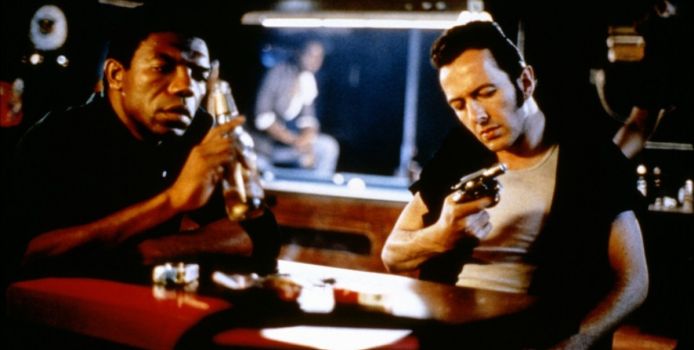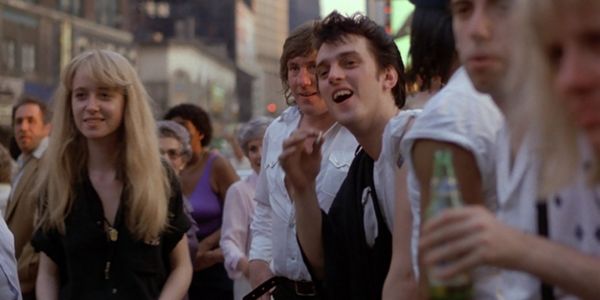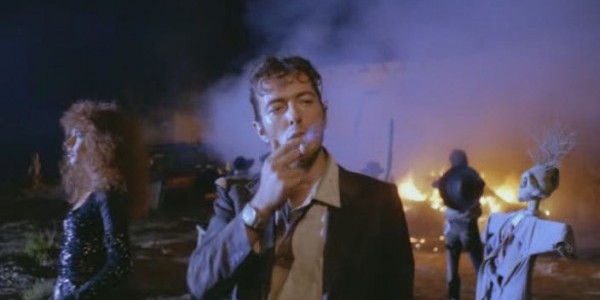Joe Strummer’s Transition From Musician To Actor

Graduate from Bridgewater State University in 2016 with a BA…
Joe Strummer, born John Grammar Mellon, is best known as the scowling, screaming, warrior-poet who sang lead vocals and played rhythm guitar for the “only band that matters”: The Clash. The man with the gravel voice and the idealist political agenda was never afraid to voice his opinions on current events. Whether it be bashing his own government or even his own generation, Strummer was ever concerned with the well-being of all people. His importance as an artist was displayed through these concerns, spearheading the punk movement, he helped bring new energy and grit to a world whose media, art, and philosophy had become stale, rigid, and hopelessly conservative. Through his lyrics, vocals, and stage performances, he provided hope and encouragement that as human beings we are collectively capable of conquering any obstacle laid before us through honest emotion, communication, and the most sacred of human expression: art.
The Call Up
Strummer’s energy flowed into other avenues apart from music as well. He attended art school after high school, and originally wanted to be a painter. After spending a lot of time squatting around London and living in poverty, he eventually started a band called The 101ers. Strummer himself freely admitted that he didn’t learn to play the guitar until he was 20 years old, and that even when he did learn, it was strictly block chords he played (which earned him the nickname Joe Strummer).

The 101ers toured the area tirelessly and were famous for their extremely high energy shows, using homemade equipment and barely making enough money to survive: this was the original ‘do it yourself’ punk ethos.Strummer’s charisma was on full display, and that charisma eventually landed him a place in a local punk band called ‘The Clash’. Strummer, and the rest of the members of The Clash went on to worldwide success before eventually falling victim to the typical egotistical pitfalls which fame tends to carry.
Pressure Drop
After The Clash officially broke up in 1986, Strummer decided to pursue a career in acting, something he’d been hinting about since the early days of The Clash. In a video which originally was intended to serve as a promo for The Clash’s first album, Strummer jokes about being in front of a camera, and playing some ‘tough guy’. All jokes aside, Strummer’s self-prophecy eventually became a reality when his band split up.

Apart from brief appearances in Martin Scorsese’s The King of Comedy, Jack Hazan and David Mingay’s Rude Boy, and a couple music videos for The Clash, Strummer’s cinematic experience prior to his first leading role in 1986 begun and ended with a short film he himself directed: Hell W10. The film, which consisted of 49 minutes of Clash music, was without spoken dialogue and instead used intertitles like those of a silent film.The ‘do it yourself’ ethos once again manifested itself in his work, the film is amateur in nature, but its rawness, and minimalist production, displays the same sincerity that all of Strummer’s art maintains.
Straight To Hell
The first film in which Strummer starred, Alex Cox’s Straight to Hell, was not supposed to be made at all. A concert tour was planned in Nicaragua but due to political tensions the tour was canceled. As a result there were a number of out-of-work musicians in the area, Strummer being one of them. The entire project was thrown together extremely quickly, and what resulted was an unfocused product that was almost universally dismissed upon its release. However, there was one silver lining to the film: Strummer’s performance.

Although he was a newcomer to acting he didn’t let his greenness define his work on the film.As with all his artistic endeavors Strummer presented himself genuinely, put 110% into the project, and delivered a surprisingly strong performance. A performance which was good enough to land him two small parts in 1987, and eventually a lead role in Jim Jaramusch’s 1989 independent film classic: Mystery Train. Between 1987 and 1989, Strummer, at the zenith of his acting career, once again decided to try his hand in a new arena, film scoring. He composed and produced music for a number of films, including Alex Cox’s 1987 film Walker, and Marisa Silver‘s 1988 film Permanent Record. After Mystery Train, Strummer focused on music production, releasing a solo album, as well as continuing his work on film soundtracks.
Rudie Can’t Fail
Strummer’s transition from musician to actor was as seamless as his transition from painter to musician. He brought an exuberance and energy to each role he was cast in, and made every appearance on the screen count. Strummer was the genuine article, his ‘do it yourself’ philosophy, uncontrived attitude and innate ability to communicate and inspire is plainly evident in his contributions to the medium of film. The acting career didn’t last long, and soon enough Strummer was on to his next medium of expression, but his brief stint shows the true essence of acting, and moreover filmmaking.It is not only a popular form of media, or cheap entertainment for the early hours or a date night. It’s an art form, and Joe Strummer simply saw it as one of many avenues in which his emotions could be transmitted.
His work not only provides magnificent aesthetics, but transmits a strong message to filmmakers and artists of all age, as Strummer so eloquently said himself: “Nothing in the world can take the place of persistence. Talent will not. There is nothing more common then unsuccessful men with talent. Genius will not. Unrewarded genius is almost a proverb. Education will not. The world if full of educated derelicts. Persistence and Determination alone are Omnipotent.” The ‘do it yourself’ philosophy, grit, determination, the honesty: Isn’t that something the film industry could use a little more of?
(top image: Strummer in Mystery Train (1989) – source: Orion Classics)
Does content like this matter to you?
Become a Member and support film journalism. Unlock access to all of Film Inquiry`s great articles. Join a community of like-minded readers who are passionate about cinema - get access to our private members Network, give back to independent filmmakers, and more.
Graduate from Bridgewater State University in 2016 with a BA in Communications: Film, Video & Media Studies. Minors in Film, Music, and Philosophy. Beginning a MA in Writing for Stage & Screen at Lesley University in Cambridge, MA January '19.













